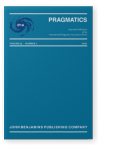Vol. 31:1 (2021) ► pp.33–61
Dear, my dear, my lady, your ladyship
Meaning and use of address term modulation by my
This paper investigates the use of my as part of address formulae by means of a corpus consisting of eight British English plays published between 1899 and 1912. For each conversational turn, address terms, speaker, addressee, power and solidarity dynamics, and speech acts have been identified. The address terms most frequently modified by my have been selected for further investigation, which allows an analysis of the alternation between dear and my dear, as well as my lord/lady and your lordship/ladyship. Results show that, when my has impact on the power dimension, the address formula with my construes the addressee as less powerful than the speaker. When my has impact on the solidarity dimension, the address formula with my construes the addressee as a close interlocutor. The functional import of my varies depending on the address term it modifies, which is consistent with its function as a modulating element.
Article outline
- 1.Introduction
- 2.Theoretical framework
- 3.Methodology
- 3.1Corpus
- 3.2Annotation procedure
- 4.Results
- 4.1 First alternation: Dear and my dear
- 4.2 Second alternation: My lord/lady and your lordship/ladyship
- 5.Conclusion
- Acknowledgements
- Note
-
References
